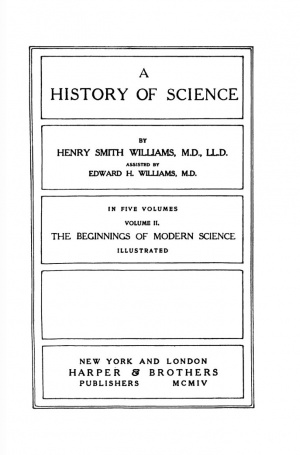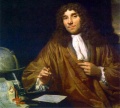Book - A History of Science
From Embryology
| Embryology - 26 Feb 2026 |
|---|
| Google Translate - select your language from the list shown below (this will open a new external page) |
|
العربية | català | 中文 | 中國傳統的 | français | Deutsche | עִברִית | हिंदी | bahasa Indonesia | italiano | 日本語 | 한국어 | မြန်မာ | Pilipino | Polskie | português | ਪੰਜਾਬੀ ਦੇ | Română | русский | Español | Swahili | Svensk | ไทย | Türkçe | اردو | ייִדיש | Tiếng Việt These external translations are automated and may not be accurate. (More? About Translations) |
Williams HS. A History of Science. (1904) Harper and Bros. New York.
| Historic Disclaimer - information about historic embryology pages |
|---|
| Pages where the terms "Historic" (textbooks, papers, people, recommendations) appear on this site, and sections within pages where this disclaimer appears, indicate that the content and scientific understanding are specific to the time of publication. This means that while some scientific descriptions are still accurate, the terminology and interpretation of the developmental mechanisms reflect the understanding at the time of original publication and those of the preceding periods, these terms, interpretations and recommendations may not reflect our current scientific understanding. (More? Embryology History | Historic Embryology Papers) |
| Online Editor |
|---|
| This 1914 historic book was published as a 5 volume set of texts published early in the 20th century. I recommend reading the 5 volumes as they are an interesting read and written with a different "feel" in language to those texts written today where brevity is carried to such lengths as to make most writings either bland or uninteresting. Note the text has been unedited and the historic nature of these articles may also include some inaccuracies. The images included on pages have been added for interest sake, as the original text was unillustrated, and links to additional resources have also been added.
|
An Introduction to the History
- The Beginnings of Modern Science - Arabian Medicine The influence of Arabian physicians rested chiefly upon their use of drugs rather than upon anatomical knowledge...
- Mediaeval Science in the West We have previously referred to the influence of the Byzantine civilization in transmitting the learning of antiquity across the abysm of the dark age....
- The Great Anatomists About the beginning of the sixteenth century, while Paracelsus was scoffing at the study of anatomy as useless, and using his influence against it, there had already come upon the scene the first of the great anatomists whose work was to make the century conspicuous in that branch of medicine...
- The coming of Harvey The time was ripe for the culminating discovery of the circulation of the blood; but as yet no one had determined the all-important fact that there are two currents of blood in the body, one going to the heart, one coming from it....
- Leeuwenhoek Discovers Bacteria The seventeenth century was not to close, however, without another discovery in science, which, when applied to the causation of disease almost two centuries later, revolutionized therapeutics more completely than any one discovery...
- Medicine in the 16th and 17th Century Of the half-dozen surgeons who were prominent in the sixteenth century, Ambroise Pare (1517-1590), called the father of French surgery, is perhaps the most widely known...
- Philosopher-Scientists and new Institutions We saw that in the old Greek days there was no sharp line of demarcation between the field of the philosopher and that of the scientist...
- 18th Century Anatomy and Physiology Part 1 An epoch in physiology was made in the eighteenth century by the genius and efforts of Albrecht von Haller...
- 18th Century Anatomy and Physiology Part 2 Among the most interesting researches of Spallanzani were his experiments to prove that digestion, as carried on in the stomach, is a chemical process...
- 18th Century Anatomy and Physiology Part 3 Some interesting experiments regarding vegetable respiration were made just at the close of the century by Erasmus Darwin, and recorded in his Botanic Garden as a foot-note to the verse..
- 19th Century Anatomy and Physiology Part 1 We have seen that the focal points of the physiological world towards the close of the eighteenth century were Italy and England, but when Spallanzani and Hunter passed away the scene shifted to France...
- 19th Century Anatomy and Physiology Part 2 Much the same thing may be said of another generalization regarding the animal body, which the brilliant young French physician Marie Francois Bichat made in calling attention to the fact that each vertebrate organism, including man...
- 19th Century Anatomy and Physiology Part 3 At the same time when these broad macroscopical distinctions were being drawn there were other workers who were striving to go even deeper into the intricacies of the animal mechanism with the aid of the microscope...
- Theories Of Evolution Part 1 When Coleridge said of Humphry Davy that he might have been the greatest poet of his time had he not chosen rather to be the greatest chemist, it is possible that the enthusiasm of the friend outweighed the caution of the critic...
- Theories Of Evolution Part 2 But even at this time the fancied security of the special-creation hypothesis was by no means real. Though it seemed so invincible, its real position was that of an apparently impregnable fortress beneath which, all unbeknown to the garrison, a powder-mine has been dug and lies ready for explosion...
- 18th Century Medicine Just at the close of the century there came into prominence the school of homoeopathy, which was destined to influence the practice of medicine very materially and to outlive all the other eighteenth-century schools...
- 19th Century Medicine Part 1 The discovery of the anaesthetic power of drugs was destined presently, in addition to its direct beneficences, to aid greatly in the progress of scientific medicine...
- 19th Century Medicine Part 2 Meantime, in a different though allied field of medicine there had been a complementary growth that led to immediate results of even more practical importance. I mean the theory and practice of antisepsis in surgery....
- Brain and Mind A little over a hundred years ago a reform movement was afoot in the world in the interests of the insane. As was fitting, the movement showed itself first in America, where these unfortunates were humanely cared for at a time when their treatment elsewhere was worse than brutal; but England and France quickly fell into line...
- Brain Structure The common ground of all these various lines of investigations of pathologist, anatomist, physiologist, physicist, and psychologist is, clearly, the central nervous system--the spinal cord and the brain....
Glossary Links
- Glossary: A | B | C | D | E | F | G | H | I | J | K | L | M | N | O | P | Q | R | S | T | U | V | W | X | Y | Z | Numbers | Symbols | Term Link
Cite this page: Hill, M.A. (2026, February 26) Embryology Book - A History of Science. Retrieved from https://embryology.med.unsw.edu.au/embryology/index.php/Book_-_A_History_of_Science
- © Dr Mark Hill 2026, UNSW Embryology ISBN: 978 0 7334 2609 4 - UNSW CRICOS Provider Code No. 00098G









